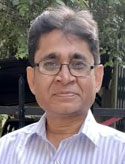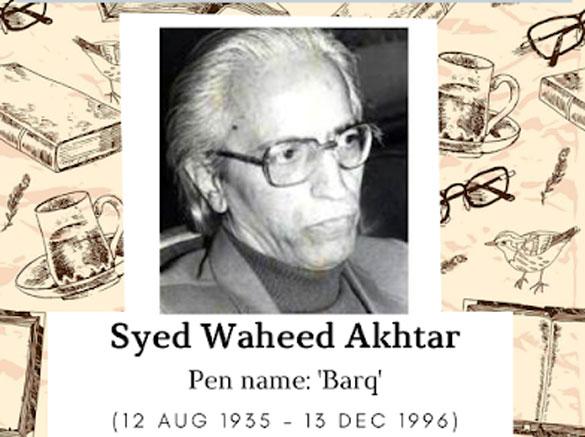Syed Waheed Akhtar: Remembering A Poet-Philosopher

By Sumit Paul, New Age
Islam
12 August
2024
Dasht Ki Udti Hui Ret Pe Likh Dete
Hain Log
Ye Zameen Meri, Ye Deevaar, Ye Dar
Mera Hai
Syed Waheed Akhtar
(People write on the fleeting sands of times/ This land is mine, this
wall and that door are also mine)
American
Nobel laureate and poet T S Eliot reintroduced John Donne's metaphysical poetry
to the modern world after nearly 300 years. I'm no Eliot. I ain't even a small
fry. Yet, it's my lifetime mission to popularise and reintroduce the works of
Urdu's lost and forgotten poets and writers. So many writers and poets enriched
the landscape of Urdu poetry. We often quote their couplets but don't know who
penned them.
Syed Waheed
Akhtar is one such remarkable poet and critic who must get a wider horizon
because his corpus of works is limited only to the critics who regarded him as
a modernist, though many others called him a progressive writer. Akhtar is also
considered to be among the few successful modern Urdu poets who took Marsia (elegy) to new heights and gave
it a new direction in this age.

Syed
Waheed Akhtar was born on August 12, 1934. Today is his 90th birth anniversary.
------
Syed Waheed
Akhtar had a streak of embalmed pessimism in his poetry but it was not so
pronounced as to sound outright cynical: Andhera
Itna Nahin Hai Ke Kuchh Dikhai Na De/ Sukoot Aisa Nahin Hai Ke Kuchh Sunai Na
De (Darkness is not so overwhelming as not to be able to see anything/
Silence is not so subsuming that nothing can be heard). Just read this couplet
written By Waheed Akhtar, "But
Banane, Poojne Phir Todne Ke Vaaste/ Khud-Parasti Ko Naya Har Roz Patthar Chahiye"
(To create, adore and then to break an idol/ Narcissism needs a stone every
day). He wrote a couplet at a young age which later invited the wrath of some
hard-core Muslims, "Lete Hain Tera
Naam Hi Yoon Jaagte-Sote/ Jaise Ki Humein Apna Khuda Yaad Nahin Hai" (I
remember you day in, day out/ As if I can't remember Khuda). Though likes and
dislikes in poetry are pretty subjective, critics as well as the connoisseurs
of Urdu poetry are of the view that his most profound couplet is: Harf-E-Inkaar Hai Kyoon Naar-E-Jahannam Ka
Haleef / Sirf Iqraar Pe Kyon Baab-E-Iram Khulta Hai (Why's negation the
ally of the fire of hell? / Why does the chapter/door of paradise open only on
acceptance; acceptance of god?). Waheed Akhtar was one of the leading Muslim
scholars and philosophers of the 20th century. So, his every couplet has a ring
of profundity: Khushk Aankhon Se Uthi
Mauj Toh Duniya Doobi/ Hum Jise Samajhte Thay Sahra Woh Samandar Nikla (The
wave emanating from the dry eyes drowned the world/ What appeared to be a
desert, turned out to be a sea). This couplet is quoted by all sincere lovers
as well as the philanderers. Yet, it has seriousness: "Thahri Hai Toh Ik Chehre Pe Thahri Rahi Barson/ Bhatki Hai Toh
Aankh Bhatakti Hi Rahi" (If focussed, the gaze remained zeroed in on a
face for years/ If gone awry, eye became roving). This couplet proves Akhtar's
experiential wisdom: Kuchh Log Iss Bharam
Mein Zindagi Bhar Jeete Hain/ Goya Duniya Bhar Ki Aql Unhin Ke Paas Ho
(Some people have a lifelong illusion, rather delusion, that they've all the
knowledge in the world). Such a brilliant poet and critic mustn't remain
confined only to the critics. General readers must also know about him and read
his works and poetry. But do they read? This is a million-dollar question.
------
A
regular columnist for New Age Islam, Sumit Paul is a researcher in comparative
religions, with special reference to Islam. He has contributed articles to the
world's premier publications in several languages including Persian.
URL: https://www.newageislam.com/spiritual-meditations/waheed-akhtar-poet-philosopher/d/132913
New Age Islam, Islam Online, Islamic Website, African Muslim News, Arab World News, South Asia News, Indian Muslim News, World Muslim News, Women in Islam, Islamic Feminism, Arab Women, Women In Arab, Islamophobia in America, Muslim Women in West, Islam Women and Feminism
